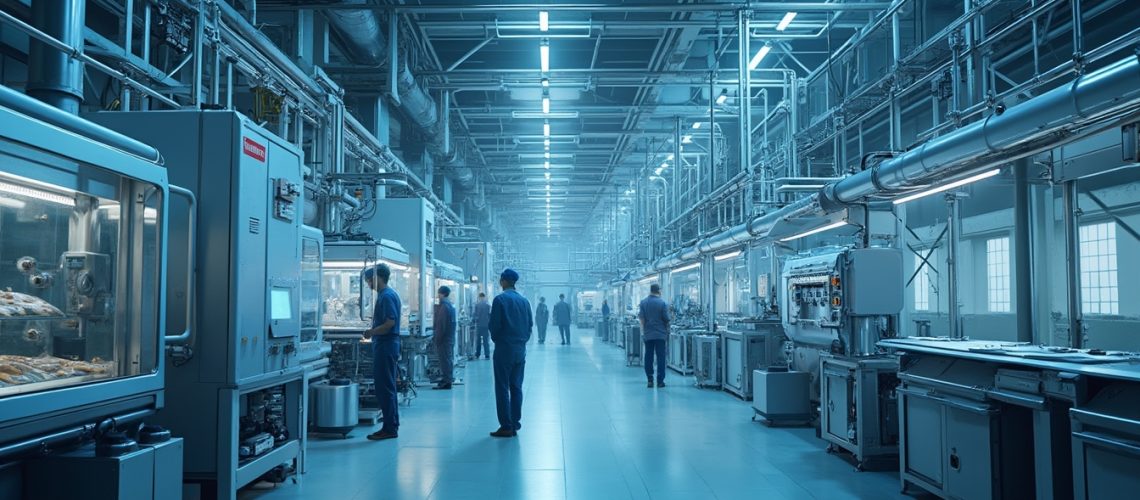The Rockwell Automation NEO Battery Materials collaboration is proving pivotal in advancing battery technology for North American electric vehicles and energy storage systems. This strategic alliance combines the manufacturing expertise of Rockwell Automation with NEO Battery Materials' innovative approaches to silicon anode production, setting the stage for a transformative leap in battery performance while addressing market needs and global battery minerals demand.
Rockwell Automation, often regarded as an industrial automation leader, has joined forces with NEO Battery Materials to create a robust framework for silicon anode material production. The Rockwell Automation NEO Battery Materials collaboration, which is already being celebrated as a game-changing initiative, targets the automation of NEO's first North American 240-ton silicon anode facility in Windsor, Ontario. With plans to potentially upscale production to 5,000 tons annually, the partnership is a shining example of how innovation and strategic planning come together in today's competitive battery manufacturing landscape.
What Does the Partnership Bring to Advanced Manufacturing?
The collaboration focuses on integrating cutting-edge automation technologies into battery materials manufacturing. This integration offers multiple benefits:
- Enhanced production efficiency through state-of-the-art equipment
- Improved quality control streamlined by data-driven processes
- Increased flexibility that adapts to evolving market demands
- Pioneering approaches to overcome conventional manufacturing limitations
The automated silicon plant at Windsor, for example, is a milestone project that promises to streamline production, reduce manual intervention, and deliver consistent product quality. This facility is not only a testament to the technological prowess of the collaboration but also highlights the capacity of modern manufacturing to scale quickly when supported by transformative automation. For further technical insights, one can explore details on automated silicon plant.
How Does Silicon Anode Technology Enhance Battery Performance?
Silicon anode materials represent one of the most promising advancements in battery technology. Unlike traditional graphite anodes, silicon anodes offer dramatic improvements in energy density—allowing batteries to store over ten times the energy in the same volume. The increased energy capacity translates into:
- Faster charging times
- Extended driving ranges for electric vehicles
- Reduced battery weight that enhances overall vehicle efficiency
- Improved longevity and stability over numerous charge-discharge cycles
Moreover, the collaboration stands at the forefront of addressing some of the well-known challenges associated with silicon anode production. For instance, overcoming issues such as material expansion during charging has been a critical focal point, prompting researchers to explore innovative electrode compositions and design strategies.
What Strategic Objectives Underpin This Collaboration?
The primary strategic objectives of the Rockwell Automation NEO Battery Materials collaboration are designed to revolutionise how battery materials are produced and commercialised. These objectives include:
- Scaling production while maintaining stringent quality standards.
- Streamlining manufacturing processes through advanced automation.
- Enhancing overall production efficiency to reduce operational costs.
- Establishing a reliable and resilient North American battery supply chain.
- Investing in next-generation material technologies such as strategic lithium investments.
Each of these objectives is crucial for ensuring that North America remains competitive in a rapidly evolving global market. In addressing the intricacies of large-scale battery production, the companies are also looking at global dynamics, such as the ever-changing landscape of global battery minerals demand.
How Are Technological Innovations Shaping This Initiative?
Technological innovations lie at the heart of this collaboration. By incorporating advanced automation systems and precision manufacturing techniques, both partners are well-equipped to navigate the complex demands of modern battery production. One notable innovation is the integration of technologies similar to liena technology innovations, which not only streamline production but also push the boundaries of material efficiency and performance.
These innovations enable manufacturers to overcome traditional obstacles, such as maintaining consistent production quality and managing the thermal complexities inherent in silicon anode materials. As the global market increasingly looks to capitalise on these new efficiencies, it becomes vital to embrace advanced methodologies that can accommodate rapid scaling and evolving industry standards.
What Are the Broader Industry Implications?
The impact of the Rockwell Automation NEO Battery Materials collaboration extends well beyond the confines of a single facility. By addressing the challenges associated with scaling battery production, the partnership is laying the groundwork for a more resilient and self-sufficient North American battery supply chain. This shift not only reduces reliance on traditional production methods but also fosters a more sustainable approach to energy storage and electric vehicle technologies.
Key benefits and market implications include:
- Strengthening the regional supply chain for battery materials
- Reducing production bottlenecks and improving reliability
- Paving the way for increased investment in renewable energy projects
- Enhancing competitive advantage in global markets faced with lithium market uncertainties
In addition, by actively addressing these challenges, the collaboration reinforces the strategic positioning of North American manufacturers in the global arena, ultimately driving forward the evolution of the renewable energy sector.
What Are the Key Challenges in Battery Materials Manufacturing?
Despite the many benefits, manufacturers must tackle several technical and operational challenges to realise the full potential of silicon anode technology. Some of the most significant hurdles include:
- Achieving material stability and durability across extended charge-discharge cycles
- Scaling production while managing costs
- Enhancing the consistency of material performance in varied operational environments
- Addressing complex thermal management issues to prevent overheating
Addressing these challenges requires not only sophisticated technology but also the integration of robust process management systems. The collaborative efforts undertaken in this project hope to pioneer solutions that may serve as a blueprint for future advancements in battery manufacturing.
What Is the Future Outlook for Battery Manufacturing?
The strategic partnership between Rockwell Automation and NEO Battery Materials is a harbinger of future trends in battery technology and manufacturing. With continued investment in innovative processes and the gradual overcoming of technical challenges, the industry is poised for substantial growth. The following points summarise the future outlook:
- Rapid advancements in production efficiency and technology integration.
- A more pronounced role for automation in streamlining complex manufacturing processes.
- Critical investments driving breakthroughs in material science and process optimisation.
- New opportunities for market expansion in both domestic and international arenas.
As the industry evolves with these innovations, companies will need to stay agile and responsive to changes in market dynamics. This approach is vital for capturing emerging market segments and sustaining long-term growth in a competitive landscape marked by a notable strategic energy shift.
What Do Industry Experts Say?
Key industry leaders have shared their insights, further validating the potency of the Rockwell Automation NEO Battery Materials collaboration. Spencer Huh, CEO of NEO Battery Materials, mentioned that the project "accelerates our move towards a higher-performance, more efficient battery ecosystem," while Brian Holte, Vice President at Rockwell Automation, emphasised the company’s dedication to growing its sector in automotive and electric vehicle battery technology.
Their comments were further supported by recent research and market analysis, which indicate that the adoption of advanced automation in battery production not only reduces production lead times but also significantly enhances product reliability—a crucial factor in today’s competitive energy storage and electric vehicle markets.
Conclusion
The Rockwell Automation NEO Battery Materials collaboration is more than just a milestone in battery technology manufacturing; it encapsulates the convergence of innovative automation technologies, strategic investments, and industry-wide efforts to modernise battery production. By addressing both technical and market challenges through state-of-the-art production methods, the partnership is setting a new precedent for scalability, sustainability, and quality in the realm of battery materials.
With the integration of advanced automation solutions and the commitment to overcoming manufacturing hurdles, this collaboration provides a robust platform for future developments. As the industry continues to evolve, the initiatives launched under this collaboration are set to play a critical role in shaping the future of renewable energy and electric vehicle technology, ensuring a competitive edge in a global market marked by relentless innovation and continuous improvement.
Further details and ongoing developments in the sector can be gleaned by keeping an eye on emerging trends and market analyses that support the vision behind this project. The strategic confluence of technological innovation, market adaptability, and forward-thinking investments positions the Rockwell Automation NEO Battery Materials collaboration as a lighthouse for modern manufacturing and sustainable energy solutions.
Want to Stay Ahead in Battery Technology Investments?
Discover how Discovery Alert's real-time AI-powered notifications can help you navigate the complex world of battery minerals and emerging technologies, providing actionable insights for both new and seasoned investors looking to capitalize on groundbreaking innovations like the Rockwell Automation NEO Battery Materials collaboration.







